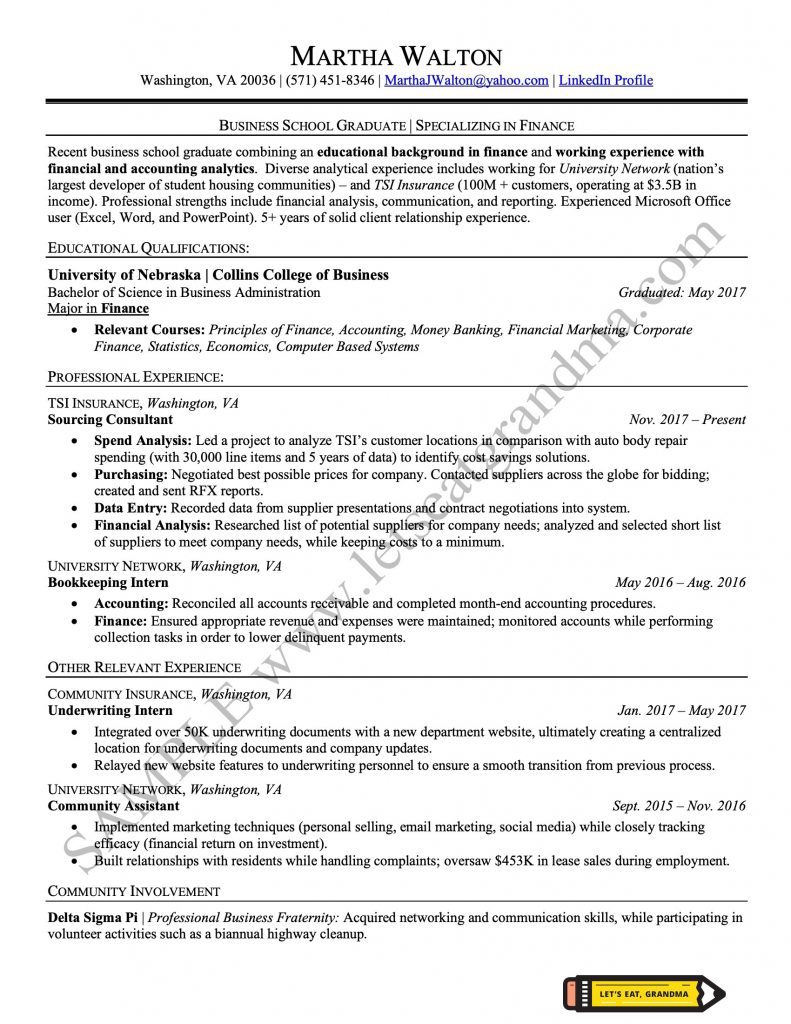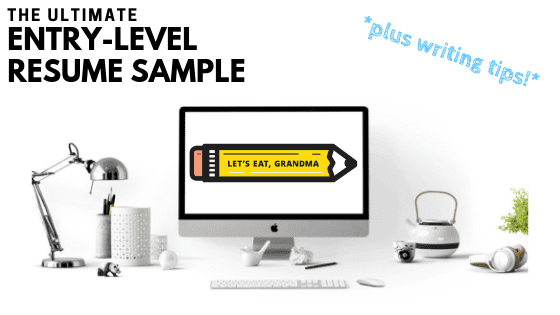We know you’re ready for your first job… but is your resume? Check out this entry level resume sample from a real client we worked with here at Let’s Eat, Grandma, and find out how to write one that’s just as great.
By: Daniel Lorenzo | Content Marketing Manager at Let’s Eat, Grandma
Congratulations! You’re officially a grown-up and ready to jump into an exciting career.
As exciting as it to enter “the real world,” you and I both know that adulting comes with tasks that aren’t exactly thrilling. Number one on that list: writing a resume.
Whether you’re still in school, just graduated, or have a job or two under your belt, it can be difficult to get your accomplishments down on paper. It’s even more difficult when you’ve heard so many conflicting pieces of resume advice. Not to mention this whole new obligation to make money breathing down your neck (no pressure, right?!)
That’s why we’re here with this helpful entry level resume sample. Here at Let’s Eat, Grandma, we’ve written over a thousand successful resumes for job seekers across every industry and experience level. Our professional business writing consultants know a thing or two about resumes, and we’re happy to share our winning formula with you.
This client (name changed) came to us with only one job out of college, and we helped her turn her experience into an attractive, scannable, metrics-based resume that made her accomplishments shine.
Check out our entry level resume sample below, then read on for some actionable tips:

What makes this a great entry level resume sample?
#1: Solid Summary
A great summary of qualifications can make or break any resume. We didn’t pull any punches writing Martha a full, robust summary that concisely conveys her experience level, skills, and the proof that she can deliver.
#2: Education First
There’s a heated debate in the resume world about whether to list your education before or after your professional experiences. Our answer, as always, is “it depends on the context.”
We listed Martha’s educational qualifications first, as she was still a recent graduate. If you’re 3 years or less out of college, earning your degree is still (probably) your most impressive accomplishment so far, so it should go before your professional experiences.
If you didn’t finish a degree, however, consider listing your education after. (And don’t stretch the truth about it! A simple note that says “Completed Coursework” or “Completed _____ credits” is sufficient to show that you have some college.)#
#3: Experience Ordered by Relevance
In an effort to be more targeted, we separated Martha’s professional experience into 2 different sections.
Under her first heading, we listed her post-college job and a relevant professional bookkeeping internship. Then, under a heading labelled “Other Relevant Experience,” we listed another internship and a university-related job. These experiences were still professional, but not quite as relevant to the position Martha was applying to.
While we rarely advise using a non-chronological, “functional” resume like this, it can be a good strategy for an entry-level resume.
This structure works well for resumes that have a variety of experiences without having much total experience. Using it here allowed us to quickly highlight Martha’s most relevant experience without losing the hiring manager’s attention.
#4: Relevant Supplemental Experience
Though not technically “professional” included Martha’s involvement in the Delta Sigma Pi fraternity in a “Community Involvement Section” (activities like this can also go in your Education section). This added value to her resume by showcasing her networking and communication skills, as well as her time-management while in school.
Supplemental/extracurricular experience should never be a priority over your professional experiences. They are an excellent addition to your LinkedIn (see #5 on this blog), but they can often take up too much space on a resume.
However, if (and only if) you have the space, your extracurricular experience is relevant to the job and/or showcases valuable professional skills, go ahead and include it on your resume. Greek life, student leadership positions, or volunteer experience are all great options.
You’re ready to enter the workforce. Now get ready to write a resume that will land you your dream job.
For even more resume help, visit our homepage and upload your resume for a FREE Career Score.
Find out how our business writing experts can get your materials in shape and land you your dream job!
(And, be sure to check out the Career Warrior Podcast for more answers to any and all of your job-search questions!)

